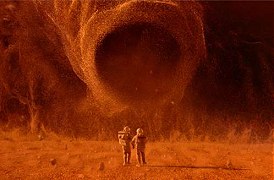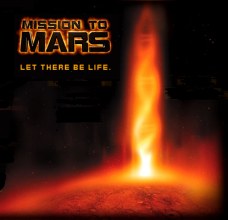| Mission
to Mars |
| |
|
|
USA, 2000. Rated PG. 113
minutes.
Cast: Gary Sinise, Tim Robbins, Don
Cheadle, Connie Nielsen, Jerry O'Connell, Armin Mueller-Stahl (uncredited),
Kim Delaney.
Writers: Jim Thomas, John Thomas, Graham Yost (screenplay only),
Lowell Cannon (story only)
Music: Ennio Morricone
Cinematographer: Stephen H. Burum
Producer: Tom Jacobson
Director: Brian De Palma
|
| Grade: F
|
Review by
Carlo Cavagna |
 o
back thirteen years to Brian De Palma's The Untouchables and picture,
if you will, the schmaltzy, broad "family" scenes in which a soft-lensed Patricia
Clarkson, in her thankless wife role, gazes adoringly at Kevin Costner's Elliot
Ness, her brow slightly furrowed with worry, as composer Ennio Morricone's warm
horns swell. Picture also the scene in which the four heroes drink toasts to
friendship as De Palma's camera circles their table over and over and over again.
Now picture two hours of this in a science-fiction movie. The same director,
same composer, and same endlessly circling, spinning cameras.
o
back thirteen years to Brian De Palma's The Untouchables and picture,
if you will, the schmaltzy, broad "family" scenes in which a soft-lensed Patricia
Clarkson, in her thankless wife role, gazes adoringly at Kevin Costner's Elliot
Ness, her brow slightly furrowed with worry, as composer Ennio Morricone's warm
horns swell. Picture also the scene in which the four heroes drink toasts to
friendship as De Palma's camera circles their table over and over and over again.
Now picture two hours of this in a science-fiction movie. The same director,
same composer, and same endlessly circling, spinning cameras.
Why? That is the question that rises unbidden after slogging through two hours
of Mission to Mars. Why did De Palma make this movie? He has nothing
new to say, and no new way of saying it. But then again, De Palma, who elevated
ripping off other filmmakers into an art form in The Untouchables and
Scarface, has never had anything new to say. In The Untouchables
(family scenes aside), De Palma stirred his pirated ideas into an appealing
melange, but in Mission to Mars, which shamelessly plunders 2001:
A Space Odyssey, The Abyss, Contact, and virtually every other serious
science-fiction movie ever made, the disparate elements never gel. As for the
cloying dialogue, it was clearly written by whoever writes the last five minutes
of every sitcom you've ever seen.
Mission to Mars is a mission to nowhere, and De Palma takes the long
route to get there. He burdens the film with a dull, protracted expository segment
that establishes the apparently critical fact that all the characters are friends.
Not just friends, actually... movie friends–warm, affectionate, fun-loving pranksters.
You know, the kind who videotape each others' weddings and mug for the camera.
 The
kind who, on the eve of leading a mission to another planet, will turn to each
other and say, "It should have been you, Jim."
The
kind who, on the eve of leading a mission to another planet, will turn to each
other and say, "It should have been you, Jim."
Anyway, Luke Graham (Don Cheadle) heads off to Mars with a group of accented
scientists while Jim McConnell (Gary Sinise) stays on Earth with Woody Blake
(Tim Robbins) and Terri Fisher (Connie Nielsen). McConnell had been first in
line to lead the mission, but wouldn't you know it, he withdrew from the pool
because he suffered a Tragic Loss. These darn things always happen at inconvenient
times, but you know–with the absolute certainty that comes with having seen
this sort of thing a hundred times before–that McConnell will be on the unavoidable
rescue mission when something goes unavoidably awry on the Red Planet. And so
he is.
The rescue operation is commanded by Blake, who displays his outstanding leadership
qualities by being very tall, and displays his outstanding tender qualities
by dancing with his wife Fisher in zero gravity. Astronaut Phil Ohlmyer (Jerry
O'Connell) is also along for the journey. It's an incredibly long journey, too.
It may take six months to get to Mars, but it seems much, much longer. They
don't arrive without incident, however. The ship is damaged, and, in a preposterously
improbable sequence of events during which nobody seems particularly rushed
even though seconds make the difference between life and death, one crew member
is lost. Best guess: the four actors must've drawn straws, and the winner was
allowed to opt out of the ludicrous, digitally rendered conclusion on Mars itself.
During this conclusion, the surviving rescue team members figure out what happened
to the first mission. Then they visit a planetarium, where they meet a cartoon.
I am not making this up.
Why did talented actors like Gary Sinise, Tim Robbins, Don Cheadle, and Armin
Mueller-Stahl jump aboard this hot-air balloon in the first place? Mueller-Stahl,
at least, who gives a dispirited performance in a supporting role, seems to
have come to his senses sometime during post-production, as he removed his name
from the credits. In contrast, the other actors bravely allowed their names
to be associated with this stinker, and deserve Oscars™ for having recited all
their lines with a straight face. As for the normally reliable Morricone--I
have no idea what movie he was watching when he composed the music, but I'm
pretty sure Mission to Mars wasn't it. Who can blame him for not wanting
to?
Review © March
2000 by AboutFilm.Com and the author.
Images © 2000 Touchstone Pictures. All Rights Reserved.

 The
kind who, on the eve of leading a mission to another planet, will turn to each
other and say, "It should have been you, Jim."
The
kind who, on the eve of leading a mission to another planet, will turn to each
other and say, "It should have been you, Jim."
